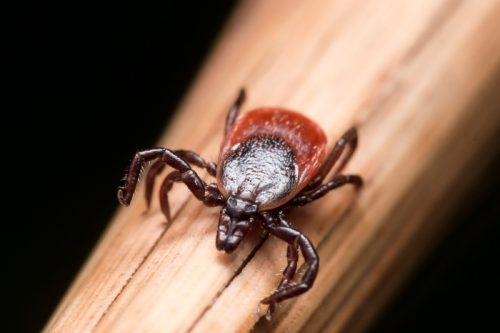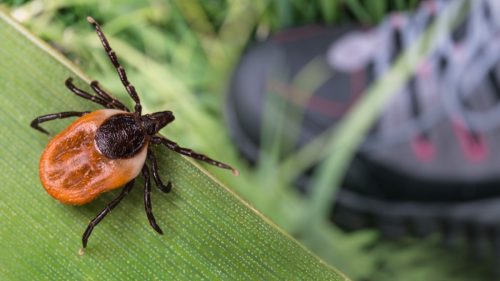If You Live in These 11 States, Watch Out for This Parasitic Bug

As the weather warms up, we have to come to terms with the fact that bugs will soon be out in full force. And while we may see these pests as nothing more than a nuisance, we often forget that some of them can also be quite dangerous. There are a number of different spiders, ticks, mosquitos, and other critters that can transmit a variety of diseases and viruses to us. In fact, experts are now warning people in 11 different states about a parasitic bug that is carrying an emerging virus. Read on to find out if you need to start keeping an eye out.
RELATED: If You Live in These States, Watch Out for the World’s Largest Spider.
Ticks carrying a harmful virus are circulating around the U.S.

A rising tick-borne virus is spreading around the U.S., a new April 2022 study published in the Emerging Infectious Diseases journal reported. According to the study, there are increasing numbers of ticks reportedly carrying the Heartland virus. “Heartland is an emerging infectious disease that is not well understood,” Gonzalo Vazquez-Prokopec, PhD, the senior study author and an expert in vector-borne diseases at Emory University in Atlanta, said in a statement to WebMD.
He added, “We’re trying to get ahead of this virus by learning everything that we can about it before it potentially becomes a bigger problem.”
These bugs have been located in 11 different states so far.

Researchers from Emory and the University of Georgia looked at virus samples from nearly 10,000 ticks they collected in central Georgia for the April 2022 study. According to their findings, 1 out of every 2,000 of the specimens they collected had the Heartland virus. But it’s hardly just Georgia. Per WebMD, the tick-borne virus was first reported in Missouri in 2009.
And as of Jan. 2021, there have been more than 50 cases of the Heartland virus disease found in the country, according to the Centers for Disease Control and Prevention (CDC). Including Georgia and Missouri, it’s been identified in residents throughout 11 different states: Arkansas, Illinois, Indiana, Iowa, Kansas, Kentucky, North Carolina, Oklahoma, and Tennessee.
RELATED: For more up-to-date information, sign up for our daily newsletter.
You could develop symptoms up to two weeks after being bitten by a tick.

People can get Heartland disease from the bite of a virus-carrying tick. Studies have shown that the Lone Star tick can transmit this virus, according to the CDC, but it is “not known if other species of ticks might also transmit the virus or if people can be infected in other ways.”
In terms of symptoms, the CDC says it can take up to two weeks for signs of the Heartland virus to show up after an infected tick bite. Most people infected with the Heartland virus experience fever, fatigue, decreased appetite, headache, nausea, diarrhea, and muscle, or joint pain. If you do have any of these signs, you should see a healthcare provider. Many have to be hospitalized because of their symptoms, per the agency.
“Some people also have lower than normal counts of white blood cells (cells that help fight infections) and lower than normal counts of platelets (which help clot blood),” the CDC adds. “Sometimes tests to check how well the liver is working (liver function tests) can show increased levels of liver enzymes.”
High tick season is approaching in the U.S.

Experts say you should be trying to prevent tick bites throughout the year, especially with emerging diseases like the Heartland virus. “You should be thinking about them almost any time of the year. It’s something that should be on everybody’s mind,” Jonathan Larson, an extension entomologist at the University of Kentucky, told USA Today
But according to WebMD, “high tick season” is approaching, as it runs between April and September. Perhaps not coincidentally, the CDC reports that most people diagnosed with the disease became sick from May through September.
“All residents of and visitors to areas where Heartland virus activity has been identified are at risk of Heartland virus infection, particularly people who engage in outdoor work and recreational activities,” the CDC warns.
RELATED: If You See This Bug in Your Home, Call an Exterminator Immediately.